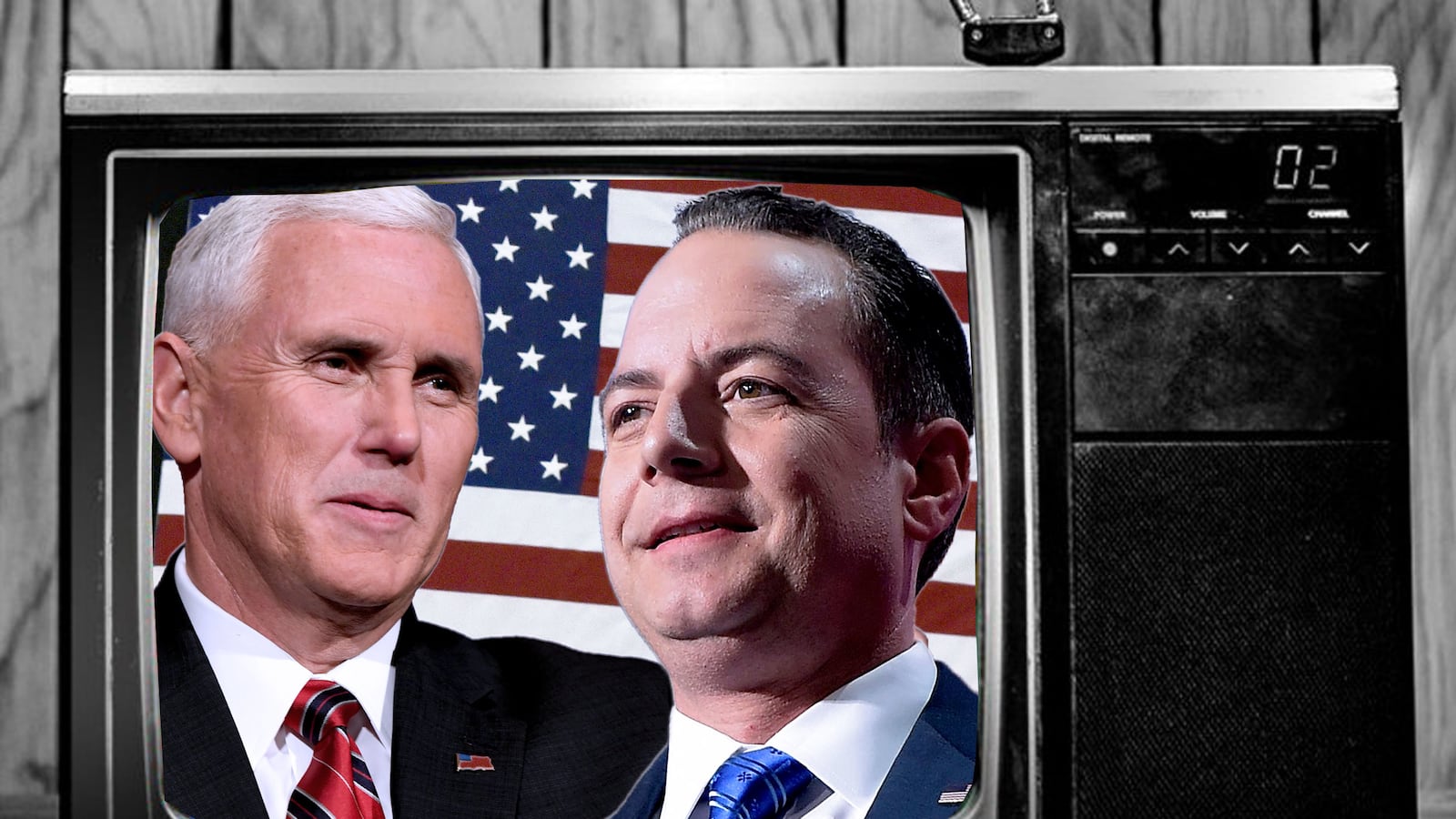By Allison Graves and Louis Jacobson
President-elect Donald Trump’s closest advisers fanned across the news shows Sunday to quell concern about the businessman’s transition to the White House following a diplomat-rattling phone call with the president of Taiwan.
“This was a courtesy call of the democratically elected president of Taiwan,” Vice President-elect Mike Pence said on NBC’s Meet the Press. “A call to congratulate the president-elect.”
Even referring to Taiwan’s leader as “president” has been a longtime diplomatic no-no in the “One China” approach shared by previous administrations, said NBC’s Andrea Mitchell.
In other news, the search for a secretary of state is taking “a little bit longer” than other top Cabinet posts, said Trump’s chief of staff, Reince Priebus, with the pool of contenders expanding beyond former critic Mitt Romney and Rudy Giuliani to include former CIA director David Petraeus.
Trump has long admired Petraeus while blasting rival Hillary Clinton over her email practices on the campaign. Petraeus was prosecuted for leaking confidential information to his biographer and mistress, and pleaded guilty to a misdemeanor charge of mishandling classified information in 2015.
“I apologized for it,” Petraeus said on ABC This Week. “I paid a very heavy price for it, and I’ve learned from it.”
Pence said Trump would review the totality of Petraeus’s military career before announcing his choice for the key Cabinet post. The transition overall, Pence said, is going smoothly.
“To be around Donald Trump, as you know, having known him for a number of years, is to be around a man of boundless energy from literally the day after the election,” Pence said, “a historic election where he won 30 out of 50 states, more counties than any candidate on our side since Ronald Reagan.”
Trump won the Electoral College but trails Clinton in the popular vote by more than 2.5 million. We wanted to know whether the county statistic was accurate, as well as its significance.
Pence’s statement is accurate but needs a bit of additional information, so it rates Mostly True.
Pence is on target that the number of counties won by Trump exceeds the number of counties won by every Republican presidential candidate since Reagan in 1984.
Trump receives credit from electoral specialists for expanding the Republican footprint, notably in places that had previously backed Barack Obama. According to a calculation by Time magazine, Trump won 220 counties that had voted for Obama in 2012, while Clinton took far fewer—17—that had gone for Romney, the 2012 GOP nominee.
And Trump outperformed Romney’s vote share in 2,728 counties, compared to just 383 where Clinton outperformed Obama. But the places where Clinton performed better than Obama did were almost always in much more populous counties.
This illustrates a general pattern for Democrats in recent election cycles: They have run strongly in populous and economically growing urban and suburban areas, but poorly in lightly populated rural areas. This has been true for the entire period we’re looking at—indeed, Bill Clinton never managed to win more counties during his two victories in the 1990s—but the partisan disparity has been growing steadily. And the pattern reached a new apogee with the Trump vs. Clinton race.
This helps explain why Clinton so far has won 2.6 million more votes than Trump did—almost 2 percentage points more—while losing so many counties.
“Loving County, Texas, has a population of 82, while California’s Los Angeles County has over 9.8 million,” said Costas Panagopoulos, a Fordham University political scientist. “The number of counties won is not necessarily a meaningful indicator, absent any consideration of the population of these counties.”
Carrier jobs
As further evidence of a smooth transition of power, Pence cited Trump’s deal with Carrier as an example of one promise already delivered. Meet the Press moderator Chuck Todd asked Pence to explain how the deal is not an example of government intervening in the private sector.
“Well, first off,” Pence said, “let’s remember now more than a thousand Hoosiers have certainty in their jobs and in their futures going into this Christmas season because of the leadership of Donald Trump.”
In a panel discussion that followed, the president of a liberal public policy group said the Carrier news isn’t impressive when you read the fine print.
“This is a bad deal,” said Heather McGhee, president of Demos. “Did you actually read the Carrier letter? It started out saying, ‘We’re pleased to inform you,’ and then it ended up talking about all of the jobs that would still be shipped overseas. The numbers I’m looking at say less than half of them are actually staying.”
Her statement rates Half True.
McGhee’s statement is not right when strictly looking at 1,400 jobs that Carrier Corporations said would move to Monterrey, Mexico. In its deal with Trump and Pence, the company preserved 800 union jobs, mainly involved with making furnaces. That’s about 58 percent of the jobs that were in danger of export.
However, if one widens the lens to encompass more of the economic picture, there are plenty of jobs from Carrier and its corporate parent still going south of the border.
United Technologies, the corporate parent of Carrier, is moving forward with its previously announced plans to close one of its factories in Huntington, Indiana, and move its 700 jobs to Mexico.
And even though the Carrier plant will retain 800 jobs to develop the furnaces, an estimated 600 jobs will move to Mexico as planned as the company relocates its fan coil manufacturing line.
“While this announcement is good news for many, we recognize it is not good news for everyone,” reads the letter.
Going by the broader view, McGhee is right that less than half (or 38 percent) of the 2,100 jobs in danger of being exported will actually end up staying.
Read more fact-checks at PunditFact.com.






